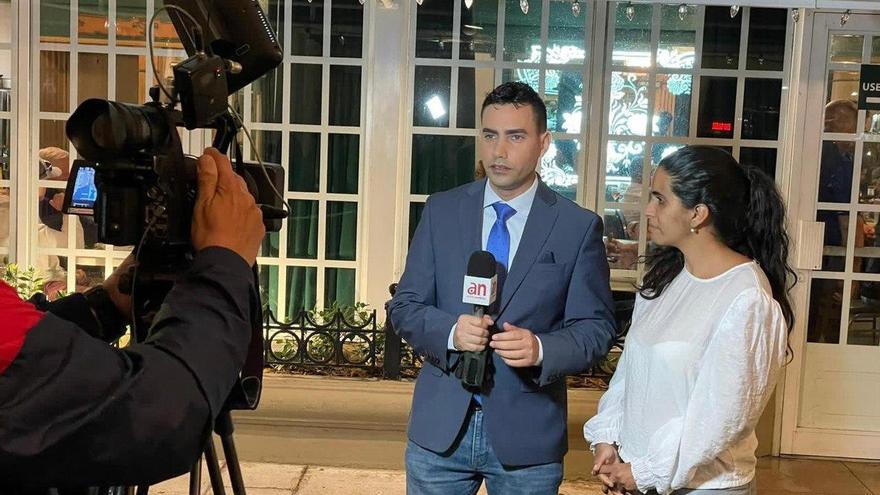
![]() 14ymedio, Havana, 17 February 2022 — The Cuban regime has not ruled on the ban on entering Cuba issued against the activist Anamely Ramos, but Humberto López, presenter on Cuban Television and member of the Central Committee of the Communist Party, did. He did so by commenting on a Facebook post by Ramos herself, with a link to the Cuban migration law and the mention of its article 24.1.
14ymedio, Havana, 17 February 2022 — The Cuban regime has not ruled on the ban on entering Cuba issued against the activist Anamely Ramos, but Humberto López, presenter on Cuban Television and member of the Central Committee of the Communist Party, did. He did so by commenting on a Facebook post by Ramos herself, with a link to the Cuban migration law and the mention of its article 24.1.
Specifically, the paragraph that indicates that the Cuban State can prevent the entry of anyone who organizes, stimulates, carries out or participates in “hostile actions against the political, economic and social foundations of the Cuban State.”
The Ramos case has generated a whole mobilization of activists in exile, international organizations and politicians from the United States.
Ramos, who was not allowed to board an American Airlines plane bound for Havana this Wednesday at the Miami airport, held a public protest at the Versailles restaurant after being forced to leave the terminal, to exert pressure on what she considers to be a violation of her right to return to his country of origin. Ramos refuses to request asylum in the United States and insisted that she will continue demanding to return to Cuba, the country where she has her residence.
The mayor of the city, Daniella Levine Cava, came to Versailles to show her support and talk with Ramos about what happened. “Cuban artist Anamely Ramos deserves the right to return home and denounce the human rights abuses that occur in Cuba. I am with her and all Cubans. The time for freedom is now,” Levine Cava wrote on her Twitter account.
US Under Secretary of State for Western Hemisphere Affairs Brian A. Nichols called the action “another cowardly attempt” by the regime that seeks to “intimidate its own citizens and crush dissent.”
In addition, the United States Embassy in Cuba tweeted: “What kind of government does not allow its citizens to return to their homeland?” adding: “The world of the 21st century must demand that the regime put an end to this cruel policy of exile.”
Cuban-American congressman Mario Díaz-Balart also showed support for the activist and member of the San Isidro Movement (MSI), who described the regime’s action as “banishment” and recalled the meeting he held with her a few months ago with the aim of denouncing the situation of the protesting rapper and political prisoner Maykel Osorbo, as well as that of other political prisoners on the Island.
“The Castro family and their dauphin Diaz-Canel continue to administer Cuba as their private farm, choosing who has permission to enter. But this is how they show how afraid they are of the voices that denounce the lack of freedoms on the prison island. Cowards!” expressed Cuban-American congresswoman María Elvira Salazar in a tweet.
Rosa María Payá, the Cuban opposition founder of the Cuba Decide platform, directly accused American Airlines of working from Miami “for the Cuban dictatorship.”
“Outrageous that American Airlines executes the arbitrary order to prevent Cuban resident citizens with valid documentation from returning to their country, violating fundamental human rights and Cuban laws themselves,” Payá added on her social networks.
For her part, Erika Guevara-Rosas, director of Amnesty International for the Americas, pointed out that “Díaz-Canel’s fear of voices with the legitimacy to denounce human rights violations is evident” and for that reason he “imposes an illegal prohibition of entry” on Anamely Ramos, “Cuban citizen and prominent leader of the MSI.”
Juan Pappier, an investigator for the Americas Division of Human Rights Watch, wrote about this case that the organization he represents “repudiates this abuse” and defends Ramos’s right to “return to her country of origin, it is a human right.”
The Center for a Free Cuba also issued a statement denouncing that “denying Anamely Ramos her right to return to her homeland is not only a violation of the Universal Declaration of Human Rights, but also violates current Cuban legislation, demonstrating the tyrannical nature of the Cuban regime.”
The NGO Democratic Culture published an open letter addressed to the American Airlines company rejecting the prohibition action against the activist and describes it as a violation of article 13 of the Universal Declaration of Human Rights, which includes the right to freedom of movement.
In Mexico, Cuban activists and colleagues of Ramos called this Thursday for a protest in front of the Cuban Embassy to denounce “the Cuban regime’s policy of exile.”
For its part, the Council for the Democratic Transition in Cuba issued a statement this Thursday in which it denounced that the Ramos case “is a flagrant and absolute violation of the Constitution” in force on the island, and “of the principle of constitutionality that should govern any act or public conduct of the organs of the State.”
They also warned that what happened with the activist is “a matter of the greatest gravity, that all Cubans should take very seriously and that deserves a harsh condemnation on our part and on the part of the international community.”
____________
COLLABORATE WITH OUR WORK: The 14ymedio team is committed to practicing serious journalism that reflects Cuba’s reality in all its depth. Thank you for joining us on this long journey. We invite you to continue supporting us by becoming a member of 14ymedio now. Together we can continue transforming journalism in Cuba.
